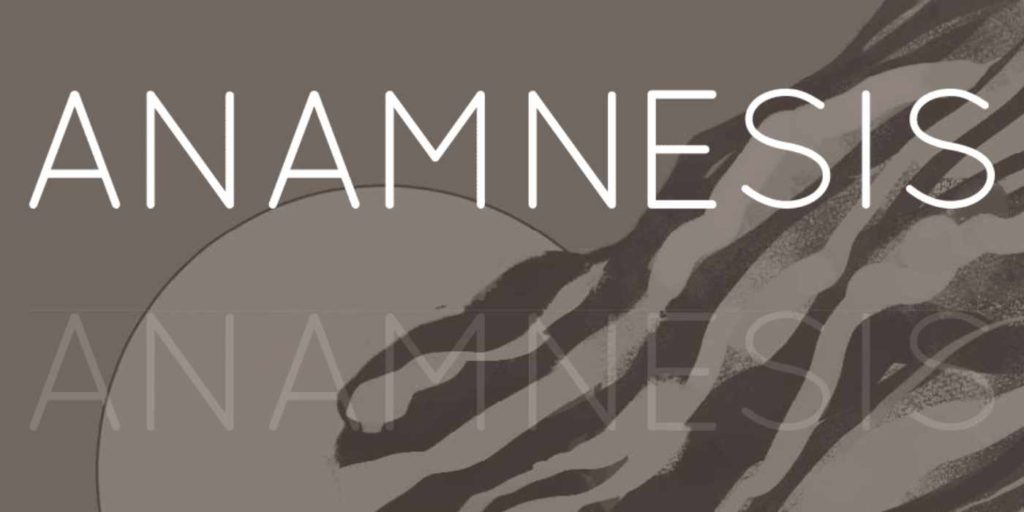First of all, if you think you’d like Anamnesis, you owe it to yourself to set aside the hour or two it takes to play and go in without too much information. The game is good, you will enjoy it. The rest of this review contains some specifics from my playthrough, and I recommend playing without that information for your first time.
Anamnesis, by Samantha Leigh, is an Ennie-nominated solo journaling game about “self-discovery, reflection, and identity.” It uses tarot cards to generate prompts across four unique acts, one for each suit. Since the character begins with no recollection of who they are, where they are, or how they got there, Anamnesis lends itself to a style of play where the details aren’t as important as the broad strokes.
I played Anamnesis as a duet storytelling exercise, with a close friend and I sharing narrative control over a single character. This worked extremely well, but I look forward to playing it solo as well. We played on Roll20 with Kaitelyn Toft’s Stained Glass Tarot Cards. Anamnesis says it’s optional, but we also used a booklet of tarot interpretation. I really like this deck, but the artwork is relatively simple, and we wanted a little extra inspiration. Anamnesis uses Minor Arcana cards for its prompts, while the Major Arcana are used to color and inform choices throughout. At the beginning of the game, you draw a single Major Arcana to represent your character’s Shadow, a past self that will haunt them throughout this journey.
The earliest phase of Anamnesis has your character encountering vague memories of their past life. This phase is where you lay the groundwork for your character’s journey through fragments and pieces. Incomplete information will be a running theme in this game, and this early stage is good at getting you used to just how mysterious and open-ended the rest of your story will probably be. You will catch glimpses of your past, just enough to inform future decisions, but chances are you won’t really know who your character is. This to me is one of Anamnesis’s greatest strengths, as it encourages you to make decisions based on what the cards indicate rather than any preconceived notions about your character. This approach pushes the player to surprise themself, as it frees them from any kind of preexisting logic or characterization.
The second and third phases guide your character through a meandering journey that leads inevitably home. My favorite part about this middle section is that it has the potential to really play around with time. The first phase could easily take place in a single moment as a handful of memories come trickling back. Phase two and three, on the other hand, could take minutes, hours, days, or longer. They involve traveling to new locations, seeing new sights, and potentially triggering further memories. Just like with the previous phase, the meager amount of information makes jumping from place to place and encounter to encounter easy. The way we decided to react to each new location informed what we knew about the character, rather than the other way around.
The final main phase of Anamnesis has your character spending some time in their home. In our case, that meant quietly reflecting and taking a shower. Like the last two phases expand time, the final phase has the potential to collapse it once again. The final phase could once again take place in a few moments, or it could be another several days. Many of the final prompts are opportunities for reflection, a chance to take what little you’ve learned about your character over the game and draw some conclusions. Like the rest of the game however, any conclusions you draw will be incomplete and fleeting.
One of the most interesting aspects of Anamnesis comes right at the very end. Your character closes the fifth act by discarding their Shadow, the past that has haunted them. They then freely choose a new Major Arcana to represent the road ahead. The story we told, about a disillusioned veteran returning to their village, felt like it had an obvious ending. But Anamnesis invites the player to abandon what came before and choose their new life as they wish. What we ended up choosing was different than what our “writer brains” envisioned, simply because we were offered that opportunity. We didn’t have to pick the result that made the most sense. The preceding phases establish that you can make decisions without knowing all the reasoning behind them. This means that you’re free to make the final choice without being beholden to any kind of narrative logic. I found this extremely freeing, and I think it led to a much more interesting story.
Anamnesis is a perfect “no-prep” game. If you have an hour or so and a tarot deck, you can get a full experience out of this game, which I really appreciate. Truly, it is a game that relies on a lack of preparation. I look forward to playing it again as a solo experience with a physical tarot deck. I’m relatively new to solo tabletop games, and I think Anamnesis is a great introduction to the genre. It is clear and simple to learn, the book’s layout is extremely easy to follow, and the prompts are intentionally kept setting- and time period-neutral to accommodate almost any kind of story. If you have any interest in solo games, you owe it to yourself to go play Anamnesis as soon as possible.
Anamnesis is available on the Blinking Birch itch.io page, and in print from Indie Press Revolution and Knave of Cups. The digital versions of this game also include ton of other great materials, including a really insightful designer’s commentary version of the game, an audiobook of Samantha reading the book out loud, optional character sheets, and .html, .txt, and .epub versions of the main text.
